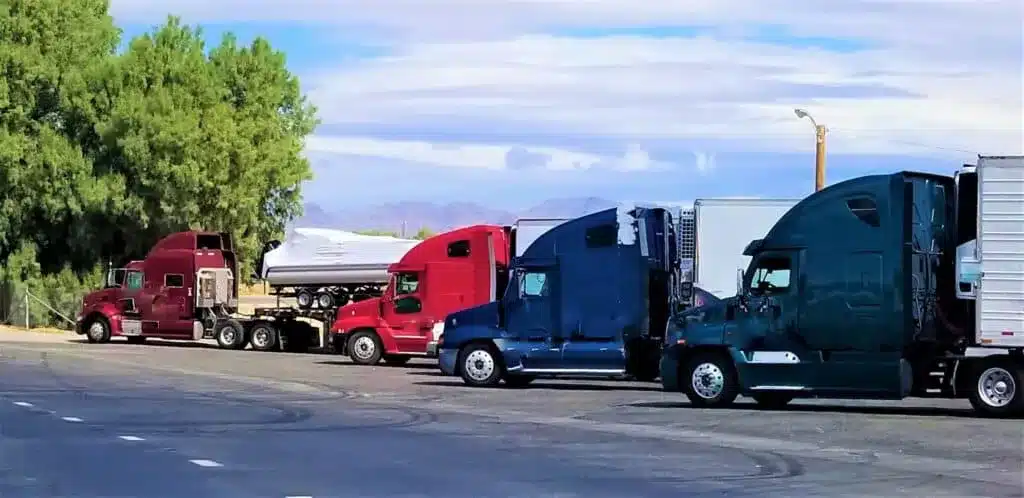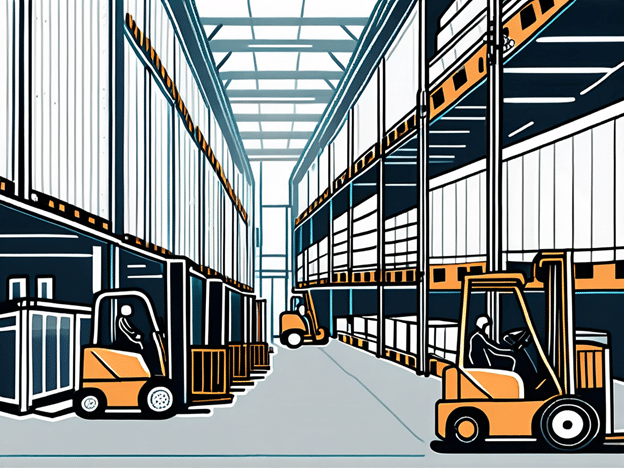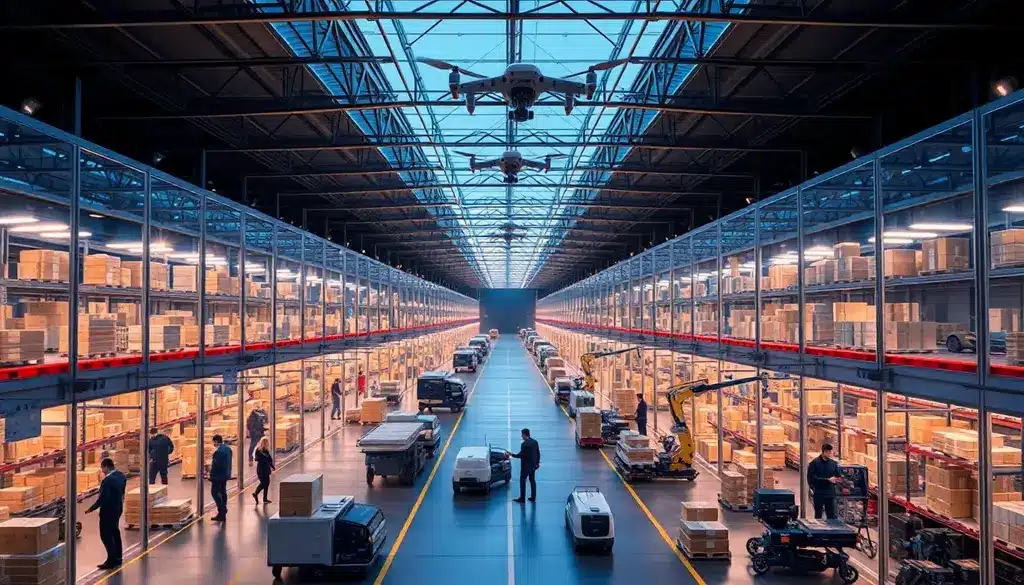
A yard management system (YMS) is a software solution designed to optimize and streamline the operations and management of a yard or outdoor storage area. It provides real-time visibility and control over the movement and location of trailers, containers, equipment, and other assets within the yard.
Understanding the Basics of a Yard Management System
A yard management system is a critical component of logistics and supply chain management. It acts as a central hub to track and manage various activities in the yard, such as check-in/check-out processes, yard inventory, trailer scheduling, and dock door assignments.
By automating these tasks, a YMS enables companies to improve operational efficiency, reduce costs, minimize delays, enhance customer service, and ensure compliance with regulations.
Definition and Function of a Yard Management System
A yard management system can be defined as a software application that provides real-time visibility and control over yard operations. It allows businesses to monitor and track the movement, status, and location of assets within the yard, including trailers, containers, and other equipment.
The primary function of a YMS is to optimize the utilization of yard space, improve yard throughput, and streamline the flow of goods in and out of the facility. It achieves this by automating processes, providing accurate information, and facilitating effective communication among all stakeholders.
Key Components of a Yard Management System
A yard management system typically consists of several key components, including:
- Gate Management: This module manages the check-in and check-out processes, validates carrier/shipper information, captures trailer and load details, and generates gate passes.
- Yard Inventory: This component tracks and monitors the inventory of trailers, containers, and other assets in the yard, providing real-time visibility into their location and status.
- Dock Door Management: It assigns and schedules dock doors for inbound and outbound shipments, helping to optimize dock utilization and reduce wait times.
- Yard Analytics and Reporting: This feature provides actionable insights and comprehensive reports on yard performance, asset utilization, labor productivity, and other key performance indicators.
Gate Management is a crucial aspect of a yard management system as it ensures a smooth and efficient check-in and check-out process. By validating carrier and shipper information, capturing trailer and load details, and generating gate passes, this module helps maintain accurate records and enhances security within the yard.
Yard Inventory plays a vital role in providing real-time visibility into the location and status of trailers, containers, and other assets. With accurate inventory tracking, businesses can optimize yard space utilization, reduce the risk of misplaced or lost assets, and improve overall operational efficiency.
The Importance of Yard Management Systems in Logistics
Enhancing Efficiency in the Supply Chain
A well-implemented yard management system plays a crucial role in enhancing efficiency in the supply chain. By automating manual processes and providing real-time visibility, companies can reduce the time and effort required to locate and retrieve trailers, containers, or equipment in the yard.

This improved efficiency translates into faster turnarounds, reduced congestion, and minimized dwell times, ultimately improving overall supply chain productivity.
Moreover, the implementation of a robust yard management system not only streamlines operations but also enhances safety within the yard. By accurately tracking the movement of assets, companies can prevent accidents, reduce the risk of damage to goods, and ensure compliance with safety regulations. Real-time monitoring capabilities allow for quick identification of potential hazards, enabling prompt action to mitigate risks and maintain a secure working environment.
Reducing Operational Costs
Implementing a yard management system can help businesses reduce operational costs through better asset utilization, optimized resource allocation, and improved labor productivity. By accurately tracking the whereabouts of trailers and containers, companies can prevent unnecessary equipment rentals, duplicate purchases, and wasted resources.
Additionally, a YMS enables effective yard planning, enabling companies to maximize yard capacity and minimize the need for off-site storage, saving on rental expenses and transportation costs.
Furthermore, the data collected by a yard management system can provide valuable insights for strategic decision-making. By analyzing historical trends and performance metrics, companies can identify areas for improvement, optimize workflows, and make informed choices to drive continuous enhancement in operational efficiency and cost-effectiveness.
Different Types of Yard Management Systems
Manual Yard Management Systems
Manual yard management systems rely on manual processes, such as pen and paper or spreadsheets, to track and manage yard activities. While these systems can be relatively inexpensive, they are prone to human errors, lack real-time visibility, and limit scalability.

Manual systems are best suited for smaller yards with minimal traffic and fewer assets to manage. However, as business requirements grow, they may become inadequate and hinder operational efficiency.
Despite their limitations, manual yard management systems have been used for decades in various industries. They offer a simple and familiar approach to tracking yard activities, making them accessible to businesses with limited technology adoption capabilities. Additionally, some companies prefer the hands-on nature of manual systems, as it allows for greater control over yard operations and a more personalized touch in managing assets.
Automated Yard Management Systems
Automated yard management systems leverage advanced technologies, such as RFID (Radio Frequency Identification), GPS (Global Positioning System), and sensors, to provide real-time visibility and automate yard operations. These systems offer enhanced accuracy, efficiency, and scalability compared to manual systems.
Automated yard management systems integrate seamlessly with other supply chain solutions, such as transportation management systems (TMS) and warehouse management systems (WMS), enabling end-to-end visibility and data synchronization.
The implementation of automated yard management systems represents a significant shift towards digitization and optimization in yard operations. By harnessing the power of IoT (Internet of Things) devices and data analytics, these systems enable predictive maintenance, dynamic resource allocation, and proactive decision-making. Furthermore, the integration of automated systems with cloud-based platforms facilitates remote access and real-time monitoring, empowering businesses to make agile and data-driven decisions to enhance overall operational efficiency.
Selecting the Right Yard Management System for Your Business
Choosing the perfect yard management system for your business is a crucial decision that can significantly impact your operations. It involves a thorough evaluation of various factors to ensure seamless functionality and scalability.

One important factor to consider is the size and complexity of your yard operations. Understanding the intricacies of your yard will help you determine the specific functionalities and level of scalability required in a yard management system to meet your business needs effectively.
Factors to Consider
When selecting a yard management system for your business, it is important to consider several factors, including:
- Yard Size and Complexity: Evaluate the size and complexity of your yard operations to determine the functionalities and scalability needed.
- Integration Capabilities: Make sure the YMS can seamlessly integrate with your existing systems, such as TMS, WMS, and ERP (Enterprise Resource Planning).
- Ease of Use: Choose a user-friendly system that requires minimal training and offers intuitive features to streamline operations.
- Vendor Support: Assess the vendor’s reputation, experience, and support capabilities to ensure a successful implementation and ongoing support.
Another critical consideration is the integration capabilities of the yard management system. It is essential to select a system that can seamlessly integrate with your current transportation management system (TMS), warehouse management system (WMS), and enterprise resource planning (ERP) software. This integration ensures smooth data flow and operational efficiency across all platforms.
Potential Challenges and Solutions
Implementing a yard management system can present challenges, such as resistance to change, data accuracy issues, and system integration complexities. To overcome these challenges, businesses should:
- Engage and train employees on the benefits and functionalities of the new system to alleviate concerns and ensure buy-in.
- Regularly audit data accuracy and establish proper data management practices to maintain the integrity of the system.
- Collaborate closely with the YMS vendor and IT team to address any integration hurdles and ensure smooth data exchange.
By carefully considering these factors and challenges, businesses can make informed decisions when selecting a yard management system, leading to improved operational efficiency and customer satisfaction.
The Future of Yard Management Systems
Technological Advancements and Innovations
The future of yard management systems is poised for significant advancements and innovations. Emerging technologies such as Internet-of-Things (IoT), Artificial Intelligence (AI), and Machine Learning (ML) are expected to revolutionize yard operations.
These technologies will enable real-time tracking of assets, predictive analytics for proactive decision-making, and automation of routine tasks, further enhancing operational efficiency and visibility.
Imagine a future where yard management systems are seamlessly integrated with IoT devices, allowing for the monitoring and control of various assets in the yard. With sensors embedded in containers, trailers, and equipment, yard managers will have access to real-time data on location, temperature, and condition. This level of visibility will enable them to make informed decisions, optimize space utilization, and prevent bottlenecks in the yard.
Furthermore, the integration of AI and ML algorithms into yard management systems will bring about a new era of intelligent automation. These systems will be able to learn from historical data, identify patterns, and make predictions about yard operations. For example, they can anticipate peak traffic hours, optimize truck routes, and allocate resources efficiently, ultimately reducing wait times and improving overall productivity.
Sustainability and Eco-Friendly Practices in Yard Management
The future of yard management systems will also witness a greater focus on sustainability and eco-friendly practices. Businesses will increasingly adopt green initiatives to reduce emissions, minimize waste, and optimize resource consumption in yard operations.
Picture a yard where solar panels are installed on the roofs of warehouses and charging stations for electric vehicles are strategically placed throughout. These eco-friendly practices will not only reduce the carbon footprint but also contribute to cost savings in the long run. Yard management systems will play a crucial role in supporting and facilitating these sustainable practices by providing visibility into energy usage, emissions monitoring, and eco-friendly routing recommendations.
Moreover, the integration of smart energy management systems with yard management systems will enable real-time monitoring and optimization of energy consumption. By analyzing data on energy usage patterns, businesses can identify areas of improvement and implement energy-saving measures. For instance, the system can automatically adjust lighting levels based on occupancy, reducing unnecessary energy consumption and costs.
In conclusion, a yard management system is an essential tool for optimizing yard operations in the logistics and supply chain industry. It offers real-time visibility, automates processes, enhances efficiency, and reduces operational costs. By selecting the right system and embracing technological advancements, businesses can position themselves for success in a rapidly evolving landscape.




